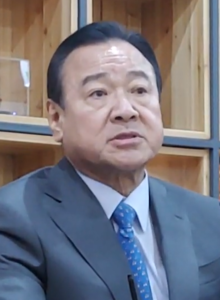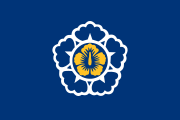Lee Wan-koo
Lee Wan-koo (Korean: 이완구; born 16 July 1950) is a South Korean politician. He was the 39th Prime Minister of the Republic of Korea.
Lee Wan-koo | |
|---|---|
이완구 | |
 | |
| 39th Prime Minister of South Korea | |
| In office 17 February 2015 – 27 April 2015 | |
| President | Park Geun-hye |
| Preceded by | Chung Hong-won |
| Succeeded by | Choi Kyoung-hwan (Acting) |
| Chairman of the Saenuri Party Interim | |
| In office 15 May 2014 – 13 July 2014 | |
| Preceded by | Hwang Woo-yea |
| Succeeded by | Kim Moo-sung |
| Governor of South Chungcheong Province | |
| In office 1 July 2006 – 4 December 2009 | |
| Preceded by | Sim Dae-pyung |
| Succeeded by | Ahn Hee-jung |
| Member of the National Assembly | |
| In office 25 April 2013 – 29 May 2016 | |
| Preceded by | Kim Geun-tae |
| Succeeded by | Chung Jin-suk |
| Constituency | Buyeo–Cheongyang |
| In office 30 May 1996 – 29 May 2004 | |
| Preceded by | Cho Bu-young |
| Succeeded by | Kim Hak-won |
| Constituency | Cheongyang–Buyeo |
| Personal details | |
| Born | 16 July 1950 Cheongyang County, South Chungcheong Province, South Korea |
| Political party | Saenuri |
| Alma mater | Sungkyunkwan University Michigan State University Dankook University |
| Lee Wan-koo | |
| Hangul | |
|---|---|
| Hanja | |
| Revised Romanization | I Wangu |
| McCune–Reischauer | I Wangu |
Biography
Lee was born in Cheongyang, Chungcheongnam-do. After graduating from Sungkyunkwan University, Lee worked as a public officer in the Economic Planning Board (current Ministry of Strategy and Finance) and later moved to the National Police Agency. From 1982 to 1984, he studied at Michigan State University in the United States and received an M. A. in Criminal Justice. From 1986 to 1989, Lee served as consul at the Consulate General of the Republic of Korea in Los Angeles, United States.
In 1996, Lee entered into politics. He joined the New Korea Party(current Saenuri Party) and in the 1996 election, he was elected as a member of the National Assembly. In the 2006 election, he was elected as a governor of Chungcheongnam-do. He resigned as governor on 23 December 2009.
Lee was diagnosed with blood cancer. After recovering, he was re-elected as a member of the National Assembly at the 2013 by-election. In 2014, he served as Floor Leader of the Saenuri Party.
On 23 January 2015, President Park Geun-hye named Lee as Prime Minister of the Republic of Korea. A three-term parliamentarian and former governor of South Chungcheong Province, Lee was confirmed by the National Assembly as Prime Minister on 16 February 2015.[1] The National Assembly voted with 148 Yes, 128 No, and 5 Abstain. 155 Saenuri, 124 NPAD and 2 Independents participated in the vote.
On 20 April 2015, Lee offered to resign as Prime Minister, amid allegations of bribery.[2][3] He formally stepped down on 27 April 2015, apologizing over a scandal in which he was accused of taking an illegal cash gift from a businessman.[4] President Park Geun-hye accepted Lee's resignation.[4]
In 2016 he was convicted of taking illegal funds.[5]
References
- (LEAD) Parliament endorses PM nominee
- South Korea Prime Minister Lee Wan-koo offers to resign - CNN.com
- The Associated Press (21 April 2015). "S. Korean PM to resign after 2 months amid bribe scandal". The Yomiuri Shimbun.
- Choe Sang-hun (27 April 2015). "South Korea’s Premier Resigns After Claims He Took an Illegal Cash Gift". The New York Times. Retrieved 27 April 2015.
- https://www.nytimes.com/2016/01/30/world/asia/lee-wan-koo-south-korea-convicted.html
| Political offices | ||
|---|---|---|
| Preceded by Chung Hong-won |
Prime Minister of South Korea 2015 |
Succeeded by Choi Kyoung-hwan Acting |

